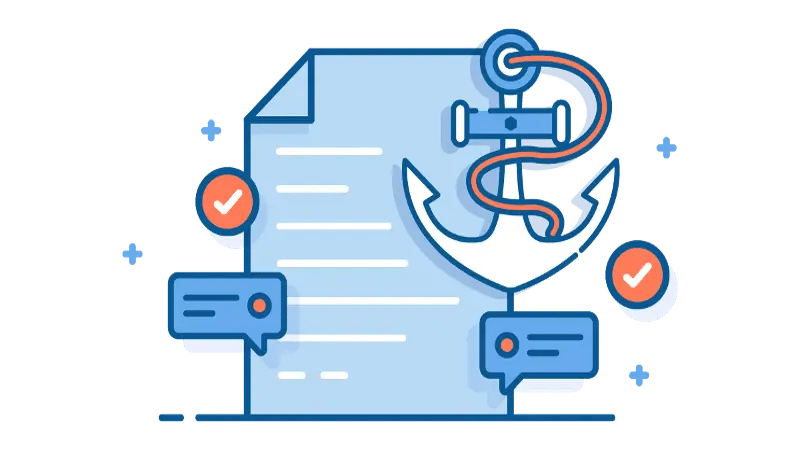搜索引擎优化可能是一个令人困惑的领域,尤其是关于外链。你会听到一些相互矛盾的建议--有人说它们对排名至关重要,也有人警告说它们会消耗你的 "链接汁液"。那么,真相到底是什么呢?外链在搜索引擎优化游戏中是敌是友?
我们将向您介绍外链的作用、它们的重要性以及如何战略性地利用它们来提高搜索引擎优化效果。


什么是外链?
在错综复杂的搜索引擎优化(SEO)网络中,了解外链的作用是打造强大在线形象的基础。外链通常称为外部链接,是从您的网站指向互联网上其他权威的相关来源。
要了解外链的意义,关键是要将其与内链和内部链接区分开来。入站链接(反向链接)是从外部网站链接到自己网站的入站链接,是对自己网站内容的认可。另一方面,内部链接将网站内的页面相互连接起来,引导用户访问相关信息。而外链的作用恰恰相反,它将用户指向外部的权威来源。其主要目的是为受众提供额外的资源、参考或背景,从而提升整体用户体验。
外链将您的内容置于更广阔的背景中,有助于创建全面的在线形象。当你链接到声誉良好的来源时,就表明你致力于为受众提供有价值的、经过验证的信息。这反过来又提升了网站在用户和搜索引擎心目中的可信度和权威性。
随着搜索引擎(尤其是谷歌)不断改进算法,以提供最相关、最值得信赖的结果,外链变得不可或缺。谷歌将外部链接视为验证内容真实性的一种方式。通过外链引用有信誉的来源,您的网站就能与更广泛的在线可信信息网络保持一致。
外链的搜索引擎优化优势
提高可信度和权威性
外链对搜索引擎优化的好处之一在于建立可信度和权威性。您的内容引用权威来源并与之链接,会为您的网站创造一个信任网络。谷歌的算法将这些链接视为您内容可靠性的证明,从而提高您的网站在搜索引擎心目中的可信度。通过与受人尊敬的来源建立联系,您可以将自己的网站定位为利基市场中值得信赖的信息中心。
改善用户体验
外链在提升网站用户体验方面发挥着举足轻重的作用。通过位置合理的外部链接提供额外资源、参考资料或深度信息,可以提升内容的整体价值。用户更有可能欣赏和参与表面之外的内容,而外链有助于提供无缝和信息丰富的浏览体验。这种积极的用户参与可以转化为更长的网站停留时间和更低的跳出率,这对搜索引擎算法来说是有利的信号。
相关性和上下文信号
搜索引擎越来越善于理解内容的上下文和相关性。外链通过为内容提供更多的上下文,在这方面做出了重大贡献。当您的外链与主题一致时,它们就会向搜索引擎发出信号,表明您的内容是更广泛的、与上下文相关的对话的一部分。这种与主题的相关性提高了在搜索引擎结果页面(SERP)中获得有利排名的可能性。
互惠关系的潜力
除了搜索引擎优化的直接益处,外链还为数字环境中的互惠关系打开了大门。通过与其他网站和内容创建者建立链接,您可以创建一种共生的动态关系,其他网站和内容创建者可以通过内链进行互惠。这种交换扩大了您网站的知名度,加强了您在相互连接的信息网络中的地位,促进了网络生态系统的蓬勃发展。
实施外链的最佳做法
有策略地将外链纳入内容是一门艺术,不仅仅是超链接那么简单。要充分发挥外部链接在搜索引擎优化(SEO)方面的潜力,就必须坚持最佳实践,以确保相关性、质量和无缝的用户体验。
相关性和上下文
有效外链的基石在于链接内容的相关性和上下文。每个外链都应与讨论的主题无缝衔接,提供额外的价值或支持性证据,以加深读者的理解。在选择外部链接来源时,应优先考虑那些直接有助于内容叙述的来源。
例如,如果您的博客讨论的是数字营销策略,那么链接到 Moz 或HubSpot等声誉卓著的来源,它们会提供对该主题的深入见解,从而提高您内容的可信度。我们的目标是创建一个连贯的信息流,每个外链都是一个自然的进展,为您的叙述增加深度和背景。
链接质量重于数量
虽然外链的数量有助于提升整体用户体验,但链接的质量应始终受到重视。搜索引擎,尤其是谷歌,重视来自权威和可信来源的链接。因此,在选择外部网站链接时,应优先考虑质量而非数量。
与信誉良好的网站建立高质量的外链可以提高内容的可信度,并向搜索引擎算法传递积极的信号。相反,不加区分地链接到大量低质量或不相关的网站会损害您的搜索引擎优化工作。因此,必须精心策划外链,确保它们能提升用户体验,并有助于提高内容的整体价值。
在新标签页打开与在同一标签页打开
决定在新标签页还是同一标签页中打开外链会极大地影响用户体验。当用户点击外链时,在同一标签页中打开外链可能会导致用户离开网站,从而增加跳出率。另一方面,在新标签页中打开链接可以让用户在不离开页面的情况下探索外部内容,确保他们之后能快速返回网站。
在做出这一决定时,要考虑链接内容的性质和用户行为。如果链接内容是补充性的或提供额外信息,但不会偏离主要叙述内容,那么在同一标签页打开可能是合适的。但是,如果用户希望在打开页面的同时浏览更全面的资源或参考资料,则建议选择新标签页。
锚文本优化
为你的外链设计有意义和描述性的锚文本是有效实施的一个重要方面。锚文本可作为链接内容的简明预览,让用户了解点击后的预期内容。不要使用 "点击此处 "或 "阅读更多 "等通用短语,而应使用能准确反映链接页面内容和上下文的锚文本。
优化锚文本可改善用户体验,并为搜索引擎提供有关链接内容的有价值的上下文。这有助于提高网页在搜索引擎结果中的索引和排名。锚文本应与内容完美结合,并鼓励用户探索链接资源。
定期更新和审查链接
数字环境是动态的,网站和内容也在不断变化。为了保持外链的相关性和有效性,定期审查和更新外链至关重要。与过时或陈旧内容的链接会对用户体验和可信度产生负面影响。定期检查外链状态,确保它们指向活跃的相关页面。
此外,还要监控链接页面的内容,确保它们仍然与内容的上下文一致。如果链接的页面发生了重大变化或不再提供有价值的信息,请考虑用更相关的来源替换链接。保持外链的时效性有助于提供更动态、更可靠的用户体验。
关于外链的常见问题
尽管外链给搜索引擎优化和用户体验带来了无数好处,但内容创建者和网站所有者的心中仍经常萦绕着一些常见问题。要充分发挥外部链接策略的潜力,直面这些问题至关重要。
害怕失去流量
网站所有者普遍担心的一个问题是,加入外链后会失去流量。这种担心源于用户会离开网站,导致跳出率增加。然而,如果有计划地实施,外链可以增加流量,提高转化率。
为了减少这种担忧,可以考虑在新标签页中打开外链。这样,用户就可以在不完全离开页面的情况下浏览外部内容。此外,要确保链接的内容是互补性的,而不是竞争性的。通过提供有价值的资源,您可以将自己的网站打造成一个信息中心,从而鼓励用户再次访问,了解更多信息。
注意: 在考虑与直接竞争对手建立外链时,应谨慎行事。与其直接链接到竞争企业,不如引用与您的内容一致的行业相关研究、报告或非竞争资源。这样可以确保您的外链有助于营造一个合作和信息丰富的网络环境,而不会将您的受众引向竞争对手的实体。
Dofollow 链接与 Nofollow 链接
dofollow 链接和 nofollow链接之间的区别经常会引起有关搜索引擎优化影响的问题。Nofollow 链接指示搜索引擎不要将权限传递给链接页面,这让人担心可能会失去搜索引擎优化的好处。不过,混合使用 nofollow 和 dofollow 链接是一种战略性方法。
Nofollow 链接适用于用户生成的内容、评论或联盟链接,可防止削弱网站的权威性。而 Dofollow 链接则通过传递权威性来促进搜索引擎优化。在必要的情况下使用 nofollow 链接,而对于信誉良好的来源则使用 dofollow 链接,这种平衡兼顾的方法确保了外链策略的周全性,并与搜索引擎指南保持一致。
监控和分析外链性能
有效的监控首先要有专门用于跟踪外链点击的分析工具。Google Analytics 和 Ahrefs 等平台可提供有关用户行为的宝贵数据,揭示哪些外链能引起受众的共鸣。通过整合这些工具,您可以全面了解用户如何接触外部内容,从而就链接位置和相关性做出明智的决策。
也就是说,监控外链性能不仅仅是跟踪点击。它涉及对网站流量和用户参与度影响的整体分析。评估外链是否有助于延长会话时间、降低跳出率或提高用户满意度。了解这些指标有助于评估外链策略的整体效果及其与搜索引擎优化目标的一致性。
有了关于外链性能的数据,您就可以做出明智的决策,优化您的链接策略。确定哪些外部内容类型最能引起受众的共鸣,并相应调整外链。如果某些链接能持续提高用户参与度或延长用户在网站上停留的时间,则应考虑扩展相关主题或在未来的内容中加入类似的高绩效链接。
搜索引擎优化是一个不断发展的领域,您的外链策略也应如此。根据从监控工具中收集到的信息,定期重新审视和完善您的方法。紧跟行业趋势,更新过时的链接,并尝试新的链接来源,以确保您的外链始终相关、有价值并符合受众的兴趣。
利用从跟踪用户行为中获得的洞察力,您可以完善您的外链策略,提升用户体验,并加强网站的整体搜索引擎优化性能。












发表评论